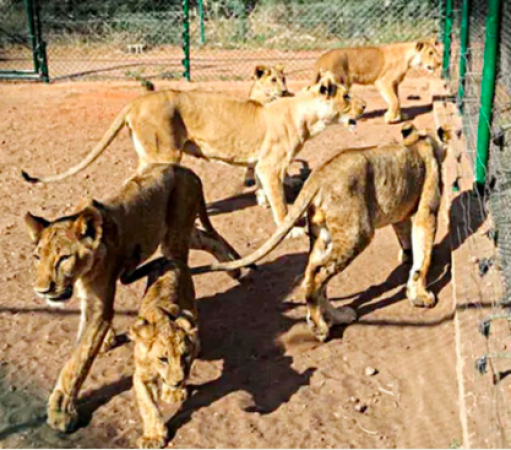
Khartoum: Concerns have been raised about what will happen to 25 lions and other animals in a wildlife reserve as a result of the intense fighting in Sudan that has destroyed the country and killed hundreds of people.
According to the facility, it lacks electricity to run safety fences around enclosures and is out of food for the cats, who need five to 10 kg of meat per day on average.
On 15 April, fighting broke out between forces loyal to army chief Abdel Fattah Al-Burhan and his rival turned deputy Mohamed Hamdan Dagalo, who is in charge of the potent paramilitary Rapid Support Forces, in the nation's capital and throughout Sudan.
Also Read: Israel attacks Syrian targets close to the Golan Heights
The Sudan Animal Rescue Centre issued a statement that began, "First, may Allah protect Sudan and the people of Sudan," and went on to warn that the situation at the sanctuary had also become "critical."
It claimed there was no longer a permanent staff member present at the sanctuary, which is about an hour's drive southeast of Khartoum and close to a military base that had experienced "deadly clashes on a daily basis."
In addition to 25 lions and other animals like gazelles, camels, monkeys, hyenas, and birds, the sanctuary also houses 25 lions.
Also Read: Indian-American Udai Tambar to take charge NYC racial advisory board
It also mentioned that one of its vehicles had been stolen. "We are under tremendous pressure due to the current power outage, and our stocks of food and drink are beginning to run out," it said.
Because the facility depends on electricity to power the equipment for the animal enclosures, the power outage had turned into "a real threat". We therefore make an appeal to all government representatives and those who can assist regarding the need to intervene as soon as possible," it said in the statement.
Makram Waleed, a 25-year-old doctor who lives in Khartoum, has created a WhatsApp community with 1,200 members that is divided into groups for each of the capital city's districts so that people can communicate about the availability of necessities.
Every time I go to a particular location, I notice that people are actually talking to one another, and we were able to get some people food and medicine, according to Waleed.
He claimed that while water was the most common need for most people, there were also numerous requests for medications, particularly those for diabetes and high blood pressure.
Also Read: Marcos Jr. of the Philippines will ask Biden for clarification on the US defence commitment
"We receive no funding or assistance. Just trying to make it easier for people to communicate," said.
Medical needs have been great because most of Khartoum's hospitals have closed and the few that are still operating only provide a few services